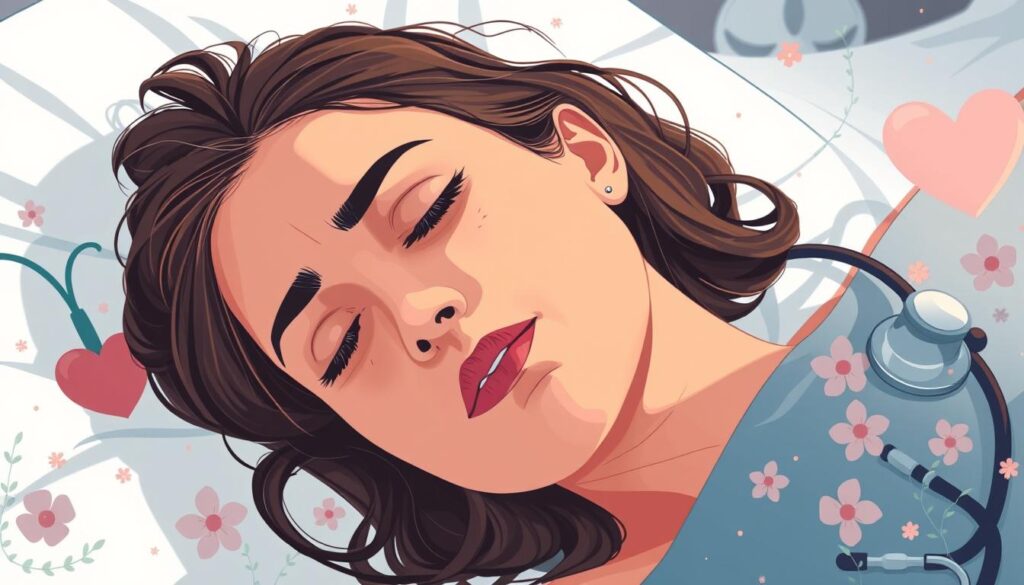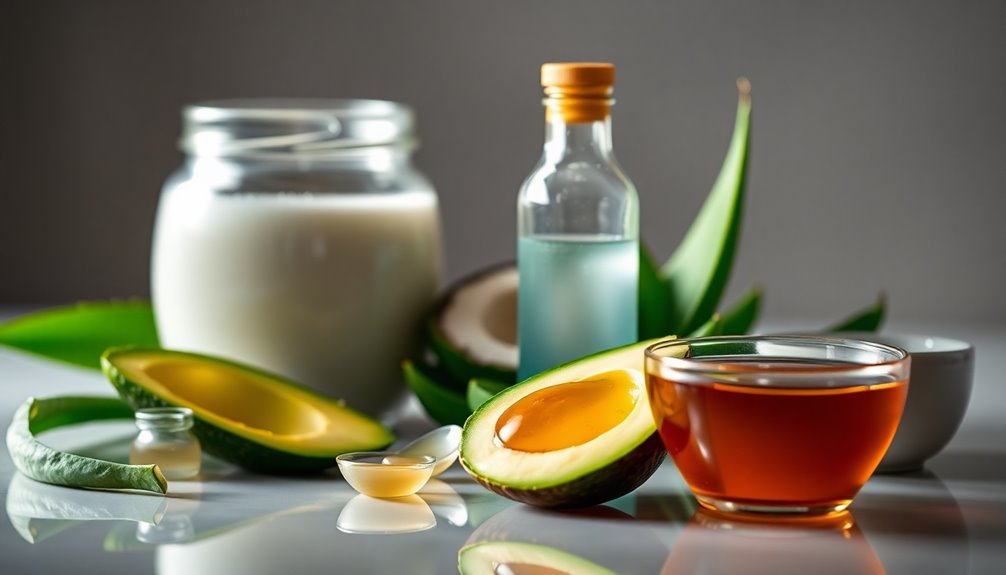Many women feel a mix of emotions when thinking about a hysterectomy. It’s more than a surgery; it’s a personal journey. It impacts your body and mind. People often wonder about their sexual health and what happens to sperm after this surgery.
The uterus removal changes the female reproductive system a lot. These changes raise questions about intimacy and sexual pleasure. You’re not alone in wanting to know. Understanding where sperm goes after a hysterectomy can give you peace of mind.
Key Takeaways
- Approximately 500,000 women in the U.S. undergo a hysterectomy each year.
- Many women report that sexual functionality remains unchanged or even improves post-surgery.
- Significant hormonal changes may occur, particularly after ovary removal.
- Common side effects may include vaginal dryness and decreased libido.
- It’s essential to seek medical advice upon noticing any persistent symptoms after surgery.
What is a Hysterectomy?
A hysterectomy is a major surgery to take out the uterus. Sometimes, it also involves removing the cervix, ovaries, or fallopian tubes. There are three ways to do it: abdominal, laparoscopic, or vaginal. Each method has different recovery times and levels of invasiveness.
Definition and Procedures
The meaning of hysterectomy is key to knowing what it involves. It’s done to solve various gynecological problems. Some common types are:
- Abdominal hysterectomy: The uterus is removed through an abdomen cut.
- Laparoscopic hysterectomy: Uses smaller cuts for less invasive operation.
- Vaginal hysterectomy: The uterus is taken out through the vaginal opening, with no outside cuts.
Reasons for Undergoing a Hysterectomy
There are several reasons a woman might need a hysterectomy. Some top reasons are:
- Uterine fibroids causing pain or bleeding.
- Endometriosis leading to severe pelvic pain.
- Chronic pelvic pain not helped by other treatments.
- Abnormal menstrual bleeding affecting daily activities.
- Certain cancers in the reproductive organs.
Statistics on Hysterectomy Rates in the U.S.
About 600,000 hysterectomies are done each year in the United States. This makes it one of the top surgeries for women. It’s second only to cesarean sections. The most common type done is the total hysterectomy. This removes both the uterus and cervix.
https://www.youtube.com/watch?v=-YVkY7N8LOc
Types of Hysterectomy Procedures
Understanding the types of hysterectomy is vital for your reproductive health choices. Each surgery type has different effects on your body.
Partial Hysterectomy
A partial hysterectomy takes out the uterus but keeps the cervix. Known as a supracervical hysterectomy, it’s chosen in about 12% of cases. It lets women keep some parts of their reproductive system.
Total Hysterectomy
A total hysterectomy removes the uterus and cervix. Sometimes, it also takes out the ovaries and fallopian tubes. This can really change your hormones. About 30% of women getting a hysterectomy have their ovaries removed too. Knowing about hormone changes afterwards is very important.
Radical Hysterectomy
The radical hysterectomy is the biggest surgery. It removes the cervix, uterus, part of the vagina, and lymph nodes near them. It’s mainly done for cancer, tackling major health problems.

| Type of Hysterectomy | Includes Cervix | Common Reasons |
|---|---|---|
| Partial Hysterectomy | Yes | Uterine fibroids, chronic pelvic pain |
| Total Hysterectomy | No | Heavy bleeding, cancer treatment |
| Radical Hysterectomy | No | Cancer intervention |
These hysterectomy types offer options for personal health needs. Each one has recovery and hormone balance to consider. And they vary in how they affect future fertility.
Understanding Sperm’s Path Post-Hysterectomy
After a hysterectomy, the way sperm moves in the body changes a lot. The uterus, where sperm usually goes, is gone. Now, sperm leaves the body with other natural fluids.
This big change affects reproductive health. Sperm’s survival and journey rely on things like cervical mucus and ovulation timing. But after a hysterectomy, these don’t work the same way. This leads to questions about the possibility of getting pregnant.
Studies have found that a lot of sperm is expelled during sexual activity. Often, sperm comes out within 30 minutes after ejaculation. This makes people wonder how well sperm can stay inside after a hysterectomy.
Some may look into assisted reproductive technology (ART) for help with pregnancy after the surgery. However, the chances of success with ART can vary. Knowing about these details can be very important if you’re exploring reproductive health post-hysterectomy.

| Aspect | Impact Post-Hysterectomy |
|---|---|
| Sperm Pathway | No access to the uterus, expelled via vagina |
| Reproductive Health | Challenges with conception and sperm survival |
| Flow-back Phenomenon | Majority of sperm expelled after ejaculation |
| Assisted Reproductive Technology | Variable success rates post-hysterectomy |
What Happens to Sperm After a Hysterectomy?
After a hysterectomy, how sperm moves in the body is quite different. With no uterus, the sperm’s pathway is changed. This affects how sperm is expelled and how vaginal secretions play a part.
Explanation of Sperm Expulsion
Without a uterus, the way sperm is expelled changes for women who’ve had the surgery. Sperm can’t move through the reproductive tract anymore. Thus, it’s removed with vaginal secretions. Understanding this is important for knowing about sexual health after a hysterectomy.
Vaginal Secretions and Sperm Interaction
Vaginal secretions help in the removal of sperm post-hysterectomy. These fluids mix with the sperm to help it leave the body. After the surgery, some women might notice changes in these secretions. This affects comfort and pleasure during sex. It shows that sexual health after the surgery isn’t just about physical changes. It includes how the body responds to stimulation too.

Sexual Changes After Hysterectomy
After a hysterectomy, you might face sexual changes. These can affect your relationship and personal pleasure. Knowing about these changes helps you adapt and keep a vibrant sexual life.
General Changes in Sexual Function
Many women see a shift in libido after a hysterectomy. Some enjoy better sexual function, while others face issues like dryness or less interest in sex. If the surgery removes ovaries, you might feel menopause symptoms quickly. These can change your sexual desire.
Feeling anxious or down can also make sex less enjoyable. Doing Kegel exercises strengthens muscles in your pelvic area. This may boost your sexual pleasure post-surgery.
Ejaculation and Clitoral Stimulation
Even with these challenges, sexual pleasure is still possible after a hysterectomy. The clitoris works as before, so many women can still have orgasms. Some might notice changes in feeling, but research shows female ejaculation and climaxes can still happen.
Techniques like vacuum clitoris therapy improve blood flow and sexual response. It’s critical to talk openly with your partner and doctors. This helps address worries and find ways to keep enjoying your sexual life.

Impact on Orgasm and Female Sexual Response
Many women wonder about sexual health after a hysterectomy. They ask if orgasms are still possible and how things might change. Emotional and physical shifts after surgery can deeply affect your experiences.
Ability to Achieve Orgasm Post-Surgery
Most women can still have orgasms after a hysterectomy. Studies show that sexual health stays the same for many. Even if sensations change, the ability to orgasm often remains. After recovery, which takes about six to eight weeks for abdominal surgeries, many find their sexual experiences continue as before.
Variations in Sensation and Orgasm Strength
How orgasms feel can change due to many reasons. One big factor is if the ovaries are removed. This can lead to decreased sex drive and vaginal dryness. Up to half of the people experience these issues after their ovaries are taken out, because estrogen is key to sexual health.

Getting rid of issues like fibroids can improve sexual response. These problems can cause pain or heavy bleeding, so removing them helps. But, emotional changes can affect how attractive or feminine someone feels. Despite these hurdles, many (up to 88%) find new ways to reach orgasm after surgery.
| Factors Influencing Orgasm After Hysterectomy | Effect |
|---|---|
| Ovarian Removal | May cause decreased libido and vaginal dryness |
| Recovery Time | Recovery typically takes 6-8 weeks; sexual activity can resume based on physician guidance |
| Vaginal Dryness | Reported by up to 50% of individuals post-ovariectomy |
| Psychological Effects | Can influence feelings of femininity; some may need mental health support |
| Alternative Stimulation Techniques | About 88% find new ways to achieve orgasm |
Hormonal Changes Post-Hysterectomy
Understanding the hormonal changes after a hysterectomy is key for women. For those who had their ovaries removed, the body may undergo quick hormonal shifts similar to menopause. Knowing these changes helps in finding the right treatments.
Effects of Ovarian Removal on Hormones
Ovarian removal changes your hormones, leading to symptoms like hot flashes, mood swings, and changes in libido. These changes can start right after the surgery and impact your well-being. A big drop in estrogen might cause vaginal dryness and make intimacy uncomfortable.
Hormone Therapy Options Available
To ease the effects of hormonal changes, there are different hormone therapy options. These include:
- Pills
- Transvaginal or transdermal creams
- Subdermal pellets
- Patches
Each therapy aims to balance hormones and relieve symptoms of ovarian removal. Talking to a healthcare provider is key to find the best option for you.

| Type of Hormone Therapy | Form | Common Uses |
|---|---|---|
| Estrogen Pills | Oral | Hot flashes, mood swings |
| Creams | Topical | Vaginal dryness, discomfort |
| Pellets | Implant | Long-term hormone delivery |
| Patches | Transdermal | Continuous hormone release |
Choosing the best hormone therapy improves your life quality after ovarian removal.
Physical Effects and Health Implications
Having a hysterectomy can bring about many changes and challenges for women. These might include the chance of vaginal dryness and changes in sexual desire. Knowing about these effects and how they feel emotionally is key to moving forward after surgery.
Potential for Vaginal Dryness
After removing the uterus, and sometimes the ovaries, a woman’s hormone levels can change. This can cause vaginal dryness. This often means less natural lubrication, which can make sex uncomfortable. Many women feel embarrassed by these changes, impacting their self-esteem. Using water-based lubricants or vaginal moisturizers can help ease these symptoms and improve comfort during intimacy.
Changes in Libido and Emotional Well-being
The emotional toll of a hysterectomy can also affect a woman’s sexual desire. Feelings of sadness or loss after the surgery are common. These feelings can impact how a woman sees her body and her sense of womanhood. Finding support through friends, counseling, or talking openly with partners is vital. It helps in dealing with these emotions. Discovering new ways to feel connected to your sexuality post-surgery is crucial for emotional health.

| Physical Changes | Possible Solutions |
|---|---|
| Vaginal dryness | Water-based lubricants, vaginal moisturizers |
| Libido changes | Counseling, support groups, communication with partners |
| Emotional impact | Therapy, educational resources, mindfulness practices |
Long-term Health Considerations After Hysterectomy
After a hysterectomy, you might face some long-term health issues. These include a higher chance of osteoporosis and heart problems. It’s essential to know these risks to stay healthy after surgery.
Increased Risk of Osteoporosis
About 25% of women see their bone density drop after a hysterectomy. This happens because they lose the protective hormones from their ovaries. This makes osteoporosis more likely.
To fight this, it’s advised to do exercises that make you bear weight. Also, eat enough calcium and vitamin D. It’s wise to get your bone density checked too.
Potential Cardiovascular Risks
The heart’s health might also suffer long-term after a hysterectomy. Taking out the uterus, especially with the ovaries, messes up hormone levels. This raises the risk of heart issues.
Lower estrogen levels make heart disease and stroke more likely. Keeping up with doctor visits and leading a healthy life can help lessen these risks.

| Health Concern | Impact | Recommendations |
|---|---|---|
| Osteoporosis | Increased risk of bone density loss | Weight-bearing exercises, calcium & vitamin D intake |
| Cardiovascular Health | Increased risk of heart disease and stroke | Regular check-ups, maintain a healthy lifestyle |
When to Speak with Your Healthcare Provider
After a hysterectomy, keeping an eye on your health is key. You should know when to talk to your healthcare provider about symptoms or issues. This helps to make sure you get help quickly if there are any complications.
Signs of Complications
If you have certain symptoms after a hysterectomy, it’s important to get medical help:
- Heavy vaginal bleeding that doesn’t stop or is very heavy.
- Severe abdominal or pelvic pain that doesn’t go away or gets worse.
- Signs of infection, like a fever, chills, or unusual discharge.
These signs may mean there are serious complications that need to be dealt with. Always take action for your health and talk to your healthcare provider if you face these problems.
Managing Persistent Symptoms
If you still have problems, like pain during sex or emotional issues, it’s key to talk to your healthcare provider. They can give you support and talk about treatments that work for you. Dealing with these ongoing issues quickly is important for your well-being.

Conclusion
Post-hysterectomy recovery brings big changes in your sexual health and overall happiness. It’s key to understand how a hysterectomy affects your body. This helps you manage this new part of your life. You might notice changes in how you enjoy sex and your hormone levels. These can impact your close relationships and how happy you feel personally.
Talk openly with your partner and your healthcare provider to help your recovery. When you share your worries or questions about sexual health, it helps keep this part of your life rewarding. It’s normal to ask for help as you adjust to these changes. Everyone’s experience is different. Having informed talks can offer real solutions.
Knowing all about hysterectomy and its effects lets you look after your health better. Focus on getting better and keep up with changes in sexual health. This way, you can improve your life quality. And you can step into this new chapter with confidence.










